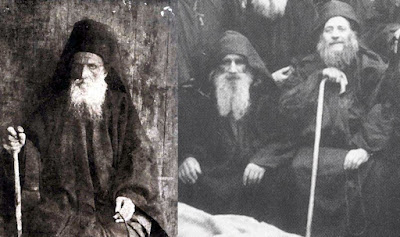 |
| Elders Daniel, Arsenios and Joseph |
When
he went into Athens, he chanced to meet an elder, an Athonite monk
from a cell in Karyes, and asked if he might go with him when he went
back. So it was that he moved to the Holy Mountain and came to know it.
In the meantime, he disposed of all his savings in alms, wherever he
thought best, and left other things to his family. He had made a firm
decision to stay on the Holy Mountain, in the most remote and ascetic
parts.
His first stop was Katounakia, at the blessed community of the Danielaioi. The founder of that community, the ever-memorable Elder Daniel, was living there at that time. He was a man of great piety, learned, wise, well experienced in ascetic life, and very gentle and comforting to those who came to him. Our Elder’s favorable impressions of that community and particularly of the holy elder remained fresh in his mind throughout his life, as he often told us. But he had set out with an ardent desire to live a life of the utmost strictness and in a more peaceful spot, and this was why he did not stay long with the Elder Daniel. Instead, he left to find the stillness that he longed for.
His first stop was Katounakia, at the blessed community of the Danielaioi. The founder of that community, the ever-memorable Elder Daniel, was living there at that time. He was a man of great piety, learned, wise, well experienced in ascetic life, and very gentle and comforting to those who came to him. Our Elder’s favorable impressions of that community and particularly of the holy elder remained fresh in his mind throughout his life, as he often told us. But he had set out with an ardent desire to live a life of the utmost strictness and in a more peaceful spot, and this was why he did not stay long with the Elder Daniel. Instead, he left to find the stillness that he longed for.
On the day of the Transfiguration he went up to the peak with the Fathers who were celebrating the feast, and there he met Father Arsenios, who was to become his inseparable companion and partner in struggles.
Father Arsenios was already a monk of the Great Schema, from Stavronikita, which was at that time idiorrhythmic; he had settled there in order to devote himself to greater asceticism and poverty, which had always been his wish. He was originally from Pontos, but the brutality of the Turks had forced him to move to the Caucasus. At a very early age he had visited Palestine, and his search for quiet and humble surroundings where he could devote himself uninterruptedly to spiritual struggle led him at length to the Holy Mountain.
At that time, Father Arsenios was living in the northern central area of Athos. He was interested in stillness and was looking for it, but could not make up his mind to start off on his own. When he heard that there was a young monk eager for that life living near the Lavra, he set off to meet him. So it was that they met, at the feast of the Transfiguration on the peak of Athos. They talked for a while, agreed on the regime that they would follow and decided to carry on their struggle together. Then they went to consult the discerning Elder Daniel at Katounakia as to where and how to begin their spiritual struggle without the danger of delusion, but with the blessing of the elders and with the sure protection of God’s grace.
When the meek and fatherly elder heard their decision and was satisfied of their good intention and zeal for the spiritual struggle, he did not dissuade them from their good purpose. But he did advise them imperatively not to start out without sealing their work with the blessing of obedience. The wise elder, whose words were always seasoned with salt, said to them laconically,
"Do you have an elder? Without the blessing of your elder, nothing can prosper. Without this seal of a paternal blessing, no spiritual work in our own monastic life bears fruit. This is why I insist that you pass through this requirement, that the grace of God may be with you throughout your lives. Go to an old man, however simple he may seem, and submit yourselves in obedience to him; and when he dies and you have laid him in his grave, you will receive as your inheritance the blessing of God, accompanying you and leading you to advancement of every kind."
Of course, it was impossible not to heed him. Their divine zeal for finding the right path and the weight of this holy elder’s advice made them receive what he said with no hesitation. As they told us later, they received the elder’s words as the word of God, as a real revelation.
From the book THE ELDER JOSEPH THE HESYCHAST (1897-1959) STRUGGLES - EXPERIENCES - TEACHINGS by Elder Joseph of Vatopaidi.